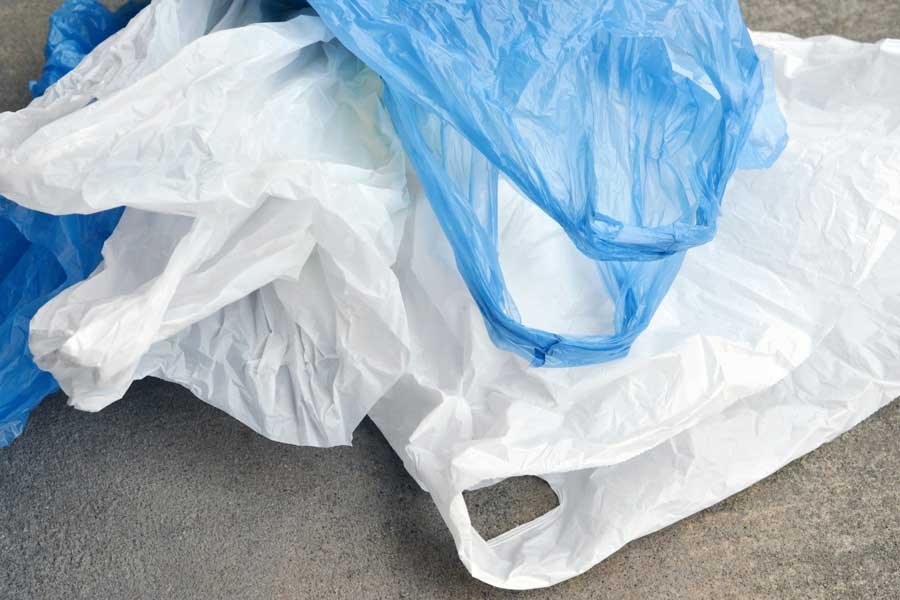The manufacturing and usage of polythene shopping bag keep growing across the country despite a ban on it.
The increase in use of plastic bags is attributable to the failure of authorities concerned to come up with a suitable alternative, experts have observed.
They also said the use of non-biodegradable polythene bag has become a common sight everywhere from shopping malls to kitchen markets due to the non-enforcement of law, lack of the 'government's good will' and adequate efforts to create awareness among people about the risk of polythene bag and its adverse impacts on the environment.
Even, Director General (DG) of the Department of Environment (DoE) Raisul Alam Mondal thinks checking the use of polythene bag is a daunting task due to the absence of cost-effective and environment-friendly alternative.
Under the Bangladesh Environment Protect (Amendment 2002) Act 1995, the government in 2007 allowed the production of 55-micron thick polythene for the packaging of garment products, medicine, fish fry, sapling and some other goods and products which virtually contributed to rise in production and the use of the harmful object, Mandal added.
Talking to UNB a number of shopkeepers and customers at different kitchen markets, including Rampura, Malibgah, Shantinagar and Baridhara, said they use polythene bags to carry essentials for unavailability of low-cost and environment-friendly ones.
However, there is good news that Bangladesh Jute Mills Corporation (BJMC) is going to come up with jute-made biodegradable ploy bags to replace polythene ones, reports UNB.
Amid the growing concern about its harmful effects on the environment, the then government in 2002 banned the manufacture, marketing and use of polythene shopping bags across the country.
Contacted, urban expert and former chairman of the University Grants Commission (UGC) Prof Nazrul Islam said, "Nearly three decades ago people used to go to markets with reusable jute or cloth bags in their hands to buy essential items. Due to change in the lifestyle and easy availability of polythene bags, people, both in urban and rural areas, hardly exercise this old habit."
Even, no one, from sellers to customers, feels the use of polythene bag is illegal and harmful for lack of enforcement of law and awareness, he observed.
Prof Nazrul said the government will have to properly enforce the law, stop the production of polythene bags and conduct massive awareness campaign to make people aware of its bad effects and bring a change in their lifestyle. "The government must persuade both the customers and shopkeepers to use environment-friendly bags discarding such harmful ones. We'll have to cut our dependency on polythene bags and go to the market with reusable jute or cloth bags as we did in the past."
Chairman of Poribesh Banchao Andolon Abu Naser Khan said the polythene bags are not biodegradable which seriously affect the environment and reduce the fertility of lands alongside harming the biodiversity and human health in many ways. "This bag takes over 400 years to decompose in soil."
He said the DoE should conduct regular drives against polythene manufacturing factories and check their marketing alongside making cheaper jute, clothes and paper bags available in market as its alternatives.
Bangladesh Poribesh Andolan general secretary Abdul Matin said the government can stop the use of polythene bags completely within six months if it sincerely enforces the ban; launches drives against illegal polythene bag-making factories and shut those. "People will surely change their habit when polythene bags are made unavailable in the market."
Asked why they cannot check illegal production of polythene bag and its use, the DoE DG said, "We often conduct mobile courts across the country, including in the capital, but the trend of using polythene bags is growing for lack of its alternative."
Under the circumstances, BJMC chief scientific adviser Dr Mobarak Ahmed said they are going to launch environment-friendly jute made 'sonali poly bags' at the upcoming international trade fair in the capital as an alternative to the polythene one.
He said they will initially supply the bags to chain shops and garment factories and gradually they will make it available in the market to replace the polythene bags. "We still didn't fix its price, but it won't be so cheaper like the polythene one."


